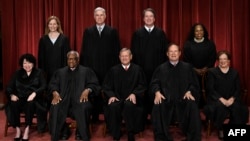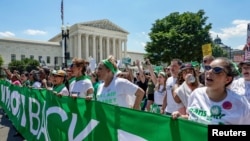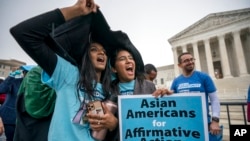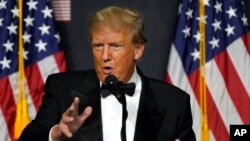In January, 83-year-old liberal Justice Stephen Breyer announced he was stepping down from the U.S. Supreme Court at the end of the term.
The announcement paved the way for President Joe Biden to deliver on a long-touted campaign promise to put the first Black woman on the nation's highest court.
Ketanji Brown Jackson, a Harvard-educated federal judge who once clerked for Breyer, was confirmed by the Senate in April. At 52, she could help shape the court for decades to come.
But Jackson's trailblazing elevation to the Supreme Court did not change its ideological balance. Through three appointments by former President Donald Trump, the nine-member high court remains dominated by six Republican-appointed justices who often vote as a bloc on hot-button issues such as abortion and gun rights.
From ending the constitutional right to abortion in June to weighing an end to affirmative action in college admissions in October, 2022 has been a consequential — and controversial — year for the court. The year straddled the end of one term and the beginning of another.
Although the court sometimes returns to a period of relative quiet following a term of big cases, this has not been the case this year.
In a string of 6-3 decisions during the term that ended in June, the court ended the constitutional right to abortion, limited the government's ability to fight climate change and expanded gun rights.
Abortion
In a case known as Dobbs v. Jackson Women's Health Organization, justices overturned nearly half a century of Supreme Court precedent.
For many conservatives, the decision came down to whether the right to abortion constitutes an "unenumerated right," meaning a right that is not explicitly mentioned in the Constitution but has nonetheless been recognized by the Supreme Court.
Writing for the majority, Justice Samuel Alito said unenumerated rights are those that are "deeply rooted in the Nation's history and tradition," and that the right to abortion is not among them.
The Dobbs ruling represented the culmination of a decadeslong conservative campaign against the Supreme Court’s 1973 Roe decision.
"I would resist the characterization of the decisions as ideologically based as opposed to jurisprudentially based," said Joel Alicea, an assistant professor of law at the Catholic University of America and a nonresident fellow at the American Enterprise Institute, a conservative think tank.
"I think that at the end of the last term and going into this term, we are seeing a significant shift in the direction the court is taking in its approach to constitutional adjudication. And that shift is more toward history and tradition and text-based approaches to constitutional adjudication and away from judge-empowering balancing tests in a lot of different areas of law," Alicea said.
But liberal constitutional scholars say the conservative wing's approach to jurisprudence makes its rulings in Dobbs and other high-profile cases no less radical.
"What they're saying is they're justifying their radical departures by suggesting that they're based in something other than precedent, stare decisis, and a long-standing understanding of what our Constitution has meant," said Caroline Fredrickson, a visiting professor at Georgetown Law Center and a senior fellow at the left-leaning Brennan Center for Justice. "I think especially once you start adding the word ‘tradition,’ it becomes extremely malleable."
In Dobbs, Fredrickson noted, Alito cites 13th-century English cleric Henry de Bracton on "whether women in the United States of America in the 21st century should have the right to control their bodies.”
“That’s radical, and I don't know where a 13th-century theologian sits in terms of our constitutional understandings, but it's not part of the original understanding,” Fredrickson said.
The abortion decision has sparked concerns that the high court could undo other protections such as the right to same-sex marriage.
Upcoming rulings
While no one expects the Supreme Court to overturn its 2015 ruling on same-sex marriage anytime soon, observers expect the justices to strike down other precedents.
In the two months since the term started in October, the justices have heard oral arguments on affirmative action, congressional redistricting, the intersection between gay rights and free speech, and a constitutional interpretation known as the independent legislature theory.
The affirmative action dispute before the court involves lawsuits brought against Harvard University and the University of North Carolina by a group called Students for Fair Admission.
The lawsuit against Harvard claims the university's admissions policy discriminates against Asian American applicants, while the UNC complaint makes a similar claim on behalf of white students.
The Supreme Court has previously ruled that colleges and universities can use race as a factor in their admissions decision-making as part of an effort to build a diverse student body. But during oral arguments in late October, the court's six conservative justices questioned the court's precedents on affirmative action, suggesting they're inclined to vote down the practice.
Another case that is likely to lead to a conservative outcome pits a Colorado web designer against the state.
Lorie Smith, a devout Christian, says she wants to build wedding websites but only for opposite-sex couples and wants an exemption from Colorado's anti-discrimination law that mandates equal treatment for all people in public accommodations.
Allowing her an exemption, Colorado argued, could lead to other forms of discrimination.
But the court's conservative wing appeared unconvinced, suggesting that forcing the web designer to build websites for gay couples would violate her First Amendment right to free speech.
Not all conservative causes are likely to receive the court's imprimatur. One case is centered on the so-called independent legislature theory.
The theory holds that the U.S. Constitution gives state legislatures nearly unfettered power to regulate federal elections without any oversight from state courts.
During oral arguments earlier this month, however, a majority of the justices appeared unwilling to embrace the theory, despite some support from several conservatives on the bench.
Reshaping the law
The high court's conservative rulings have led some critics on the left to disparage it as the "radical Trump court."
But when it comes to the litigious former president, the court has exhibited a degree of independence.
In October, it rejected a request by Trump that an independent auditor be allowed to review classified documents seized by the FBI from his Mar-A-Lago estate. And in November, the court rejected an attempt by Trump to prevent Congress from obtaining his tax records as part of an investigation.
"I think any suggestion that they are beholden in some way to the former president is clearly wrong and without any foundation," Alicea said.
Fredrickson said the court's rejection of Trump’s requests suggests they are “more independent than they are” perceived to be.
"I think they are, however, embarked on this project to radically reshape our law, and it really is irrelevant whether they support Trump or not," Fredrickson said.







